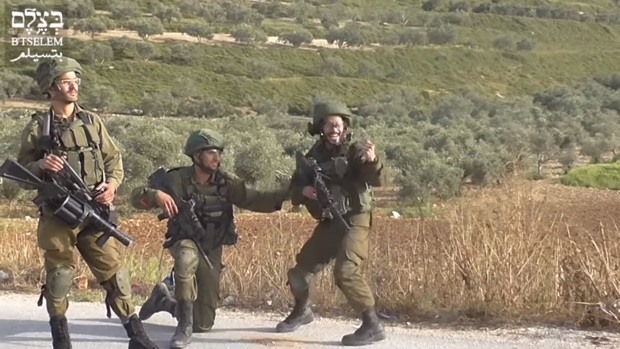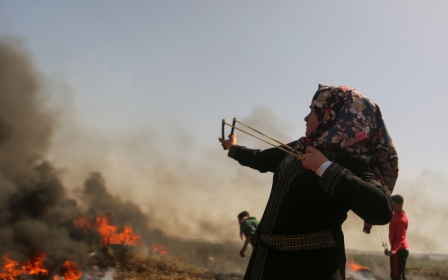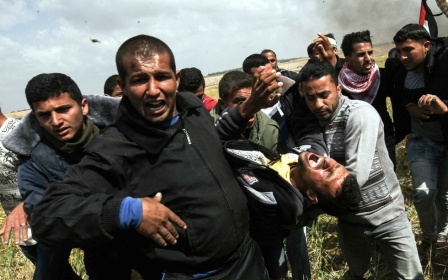'Son of a bitch': Israeli soldier cheers after shooting Palestinian

An Israel soldier has been recorded cheering and shouting "that son of bitch" after shooting a Palestinian with a rubber-coated bullet during a West Bank protest, following a long discussion with his superior on how best to hit him.
The video footage, released on Tuesday by the Israeli rights group B'Tselem, was taken at a protest over an Israeli roadblock in Madama, south of Nablus, at about 2pm on 13 April.
According to B'Tselem, about 30 residents of Madama tried to remove the roadblock, and about 11 Israeli soldiers then arrived at the scene. B'Tselem says protesters were throwing stones at the soldiers.
The video footage shows three Israeli soldiers discussing the best way to stop the protest by shooting a demonstrator with a rubber-coated bullet.
The apparent commander among the three tells his charge: "Stay kneeling, stay in a crouch, bro. Like that. It's far, still too far. Wait for them to come nearer."
"I'm aiming using the gun sights. Do you see where the one red is? As soon as he pops up, I swear I'll give [...]," the kneeling soldier replies.
"Bro, you'll barely reach them. Get it? Rubber bullets are weak," the commander said. "As soon as they realise that the stones don't reach, they'll be frustrated... they'll come a bit closer.
"See the guy in white? He's a bit brave. He'll come closer. Wait until he does. Don't shoot - that'll make them move away.
"We need one good hit, and that's it. That'll teach them not to throw stones."
See the guy in white? He's a bit brave. He'll come closer. We need one good hit, and that's it. That'll teach them not to throw stones
- Israeli commander
The soldier then fires, before jumping and whoops in excitement in Hebrew: "That son of a bitch!"
"You hit him," says his commander. The third soldier then says the Palestinian was hit in the hand.
The first soldier then asked the commander if they are allowed to use live ammunition.
"One live bullet and the whole thing will be over," he says.
The commander replies: "We don't fire live ammunition. We don't need it," adding that using metal-coated rubber bullets, which are considered less than lethal ammunition, is "good for the video".
B'Tselem reported that seven residents of Madama suffered injuries from rubber-coated metal bullets during the protest, and two were taken to hospital.
Second shooting video
It is the second video released in April showing Israeli soldiers celebrating after shooting unarmed Palestinian protesters.
The first, in early April, was footage of a 22 December shooting near the Gaza security fence, where an Israeli sniper shoots and injures a Palestinian, while a voice is heard to say: "Wow, what a video!... YES! That son of the bitch."
The Israeli army did not issue a statement regarding the video at the time of publication.
Naftali Bennett, Israel's minister of education, told Hebrew news sites at that time: "Since when do we judge a soldier according to the elegance of his speech? I prefer a cheerful soldier from a grieving father."
Hanan Ashrawi, a senior Palestinian Authority official, said the video showed what Palestinians have long alleged regarding soldiers' actions on the Gaza border, "but nobody has been listening".
"We have been complaining about this, but unfortunately nobody believes it unless an Israeli source documents it," Ashrawi told AFP.
"The issue of sniper fire is not something new at all, but it is time for the world to see and to believe what we have been saying all along."
Both videos come after the March of Return mass protests along the Gaza border that began on Friday 30 March.
Almost 40 Palestinians have been killed by Israeli troops since then, and hundreds were injured. There have been no Israeli casualties.
This article is available in French on Middle East Eye French edition.
New MEE newsletter: Jerusalem Dispatch
Sign up to get the latest insights and analysis on Israel-Palestine, alongside Turkey Unpacked and other MEE newsletters
Middle East Eye delivers independent and unrivalled coverage and analysis of the Middle East, North Africa and beyond. To learn more about republishing this content and the associated fees, please fill out this form. More about MEE can be found here.




